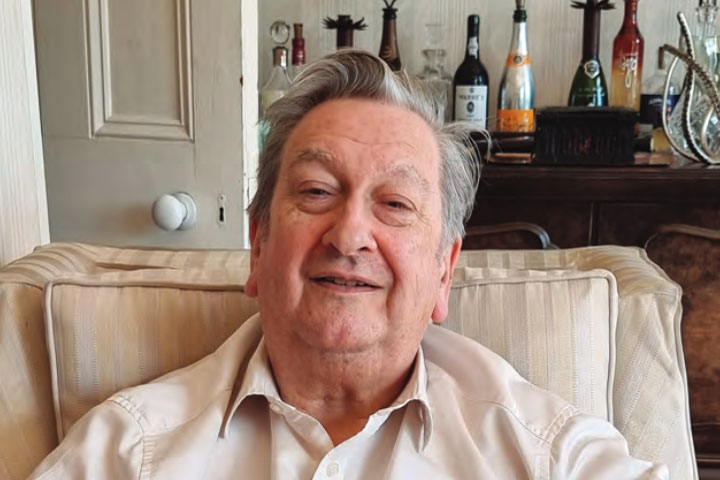


Raymond Keene OBE, has been an integral aspect of my chess upbringing. I wanted to visit Ray and ask him a few questions, so that people might get to know a little more about him. I am grateful to him for letting me do so, and I give an abridged version of our informal chat, over a cup of tea at his home in Clapham in late August, finishing with his favourite game.
You are in many ways a trailblazer – an important figure in British and world chess history, both as a player and organiser. It is fair to say you are also a controversial figure in some ways. How would you describe yourself?
“I know what I believe in, I know what my own values are and if people want to disagree, they are free to do so. I am happy to admit mistakes, but if I have an opinion, I stick to it. As Voltaire said, ‘I may disagree with what you say, but I will defend to the death your right to say it.’”
Did this ever translate into your chess, I mean the willingness to persevere with something you believed in?
“I invented a line of the 1...g6 defence. It involved a very early ...Nc6 and ...a6 when White played the Three Pawns Attack with pawns on d4, e4 and f4. Many people told me it was unsound, but I continued to play it, I think eight times. When other people tried it, they all lost, but I did not lose any games at all. Indeed, I played it against the Soviet Grandmasters Anatoly Lein and Yuri Balashov, and the Yugoslav Grandmaster Marjanovic. If I ever recommended something in print, I played it and did not care if my opponent knew it was coming.”
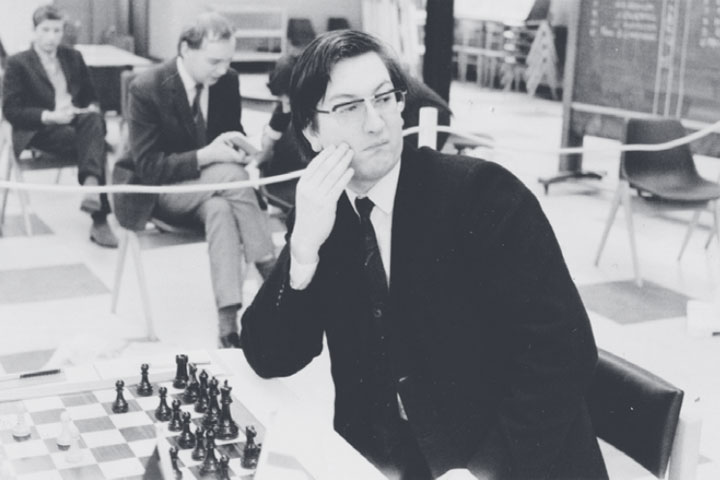
The often hypermodern-orientated Ray Keene has just wheeled out a double fianchetto against German GM Klaus Darga on board 2 of a 1971 England-West Germany match at Cheltenham.
Where were you born?
“Clapham, at number 97, just down the road from where I live now.”
How did chess find its way into your life?
“My mother taught me when I was six years old. She wanted a bath, and she gave me some chess pieces to play with, but I never knew what to do with them and I wanted to know, so she taught me. I quickly became quite good, playing later at school. There used to be a chess club meeting at Clapham Common on weekends. Some young boy asked if I would like to play, so we did and I wiped him off the board.
“It transpired that he was the London Junior Champion and he said I should enter the London Under-14’s which I did, and came second. The next year I entered the Under-16’s and came second, and the year after I entered the London Under-18’s and I won it. This title was a big story in 1964, but, of course, these days if you aren’t playing for some European or world title at the age of 16 you are a no-hoper. That same year I went on to win the British Under-18 Championship and soon after I can second in the World Junior Championship.
Why were you so good at chess? Was it talent, hard work or both?
“I was not naturally good at chess, but I studied like crazy. I acquired a number of books including one by Harry Golombek on the 1948, ’54 and ’57 world championships. He wrote books about Capablanca and Reti. I studied Alekhine’s best games, and also Peter Clarke’s books on Petrosian and Tal. British Chess Magazine was also immensely useful. I studied patterns and memorised everything, categorising the games into specific openings and translating the moves and principles into my games. I should say I also studied Nimzowitsch and his books My System and Chess Praxis.”
Did you intend to try to obtain the title of grandmaster, which you did – the second person in England ever to hold the over the board title after Tony Miles?
“Oh yes, I intended to do it.”
Do you have a favourite game of yours?
“Yes, indeed. Keene-Kovacevic, Amsterdam 1973. Take a look at 22 Ra7 which stunned my opponent!”
And a favourite game that isn’t yours?
“There are many, but I think it would have to be the fifth game of the 1963 world championship match between Petrosian and Botvinnik. It is a staggering example of endgame skill. It also features a fantastic king march by Petrosian. Further, it shows how a knight can be far superior to a bishop in the endgame, and how a very small force can achieve huge dynamism.” [ Ed. – We’ve included that classic game in the replay part below for readers to enjoy it.]
What favourite chess book would be your companion on a desert island?
“I think it would be Harry Golombek’s book, Richard Reti’s Best Games. I love the richness of Harry’s prose, which influenced the way I write. He was very erudite and elegant, and he had a wonderful turn of phrase. The games selection is excellent, and I was always interested to see the way in which Reti achieved artistry in his games, beating some of the world’s strongest players.”
What is your favourite book that isn’t about chess?
“It would be Lord of The Rings. I have read it ten times.”
And a film?
“Conan The Barbarian. The first film, not the remake.”
And a favourite piece of music or song?
“Mahler’s 7th Symphony.”
You have written 206 books on chess to date. Which are you most proud of?
“Aron Nimzowitsch: A Reappraisal. I did a lot of research for that, and I love the way Nimzowitsch played chess, and enjoyed his essays on over-protection which I took into my games. He is one of the greats and this book I think showed this. His paradoxical move Nh1 against Rubinstein in Dresden 1926, although technically rubbish, was one example of his forward thinking.”
You have achieved so many things on and off the board in chess. When you reflect, is there one thing that you are most proud of?
“Organising the World Chess Championship in 1986 in London (Karpov-Kasparov). We had not had a world championship in London for a century. I organised the match, wrote the books and made the television series.”
Is there something that you wanted to achieve in chess but didn’t?
“I could have won the World Junior Championship and the Commonwealth Championship, but drew two games – one in each event – which I should have won. Also, I have had winning positions against Geller and Keres which I drew. I never planned to be world champion!”
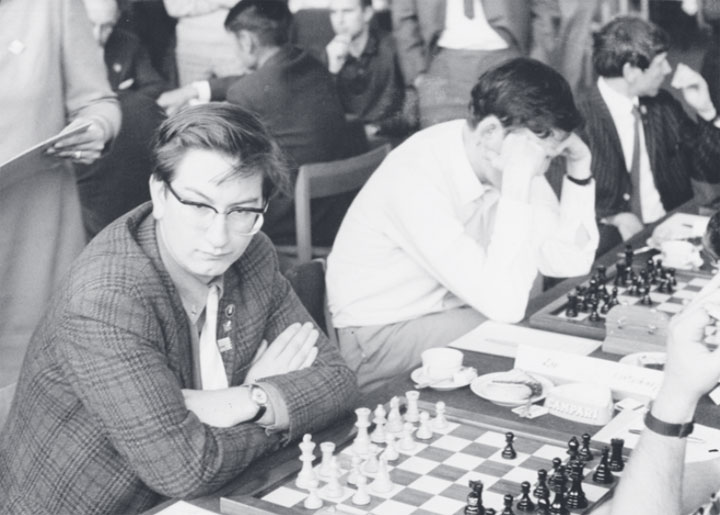
Still untitled in 1968, Ray Keene won an individual bronze medal on board 4 when he scored
a huge 13/17 for England at the Lugano Olympiad, including drawing this game with Boris Spassky.
You were involved with the chess legend that was Viktor Korchnoi in his 1978 world championship battle against Anatoly Karpov. Why do you think such a behemoth of the game selected you, as opposed to the many other options around the chess world at the time?
“Good question! Maybe I stood out because I had written a lot of books and chess columns, and organised tournaments, so I had experience, but from a purely chess perspective and also back then I was an expert on openings. Our relationship began in 1974 with the first Korchnoi-Karpov match when Korchnoi won game 21 with an idea which I had suggested to him while I was visiting Moscow as a journalist.
“My philosophy of chess appealed to Korchnoi for sure. I believed in playing to win as Black – not merely to equalise. You actually had an opportunity to tear the white player apart, by exploiting commitments made by having the first move. Imagine punishing White, for being White! Back then I sometimes played risky but interesting openings as Black such as 1 e4 c5 2 Nf3 g6 3 d4 Qa5+, which I had mixed results with.”
Which player before your time would you most like to have met?
“Aron Nimzowitsch.”
If you became FIDE president today, what one thing would you change immediately?
“By becoming FIDE President, the most significant change will already have been made. Get rid of the current president! He is a Russian and in the current state of political affairs, I do not think he should be in charge. Seriously, I would make Anand the president.”
If you had dinner this evening with three guests, dead or alive, who would they be?
“Julius Caesar, Napoleon Bonaparte and Leonardo da Vinci.”
You have been married to your wife Annette for 49 years. Is she interested in chess at all?
“Only when I write general columns. She ignores the chess moves.”
At the time of this interview Rishi Sunak, the British Prime Minister, has just announced a grant of up to £1 million for chess development. What is your view of this? Also chess in schools – do you think that it should be mandated as a subject?
“Well, of course it is good news and I hope that the English Chess Federation spends the money wisely. However, chess in schools should not be mandated as some people are suggesting. In my opinion, it should be voluntary and encouraged. If I had been forced to play chess at school, I probably would not have taken up the game as I did. It is perfectly fine to mandate having it as an option. I believe the same about physical sports. I was forced to play rugby at school and have hated the game ever since. Even more than this I loathe and despite football.”
Tell me about your new book. What is it?
“It is called Chess in the Year of the King, published by Hardinge Simpole. I have adapted forty-one of my columns originally written for The Article and British Chess Magazine, together with some additional games and illustrations, in which my primary aim has been to connect chess to wider political, scientific and cultural concerns.”
Thank you very much, Ray.
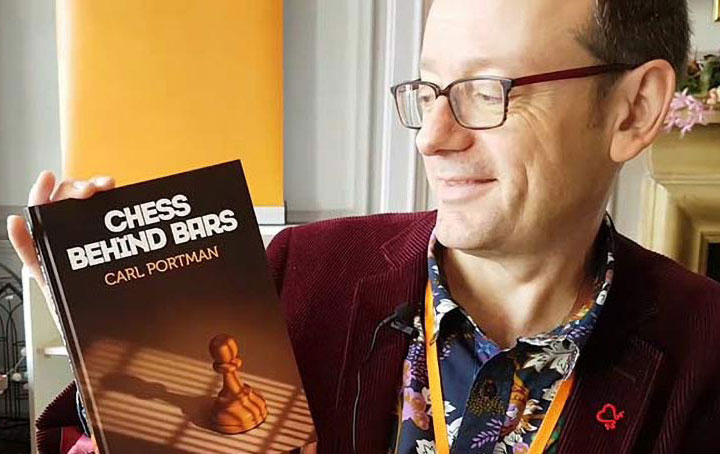
Carl Portman a chess player, author, and columnist living in Oxfordshire. He served for 30 years with the Ministry of Defence in the UK and Germany. "Chess has opened many doors in my life and allowed me to meet many inspirational people," he says. "My remit is to foster the pursuit of Chess in Prisons across England. Why am I doing it? It is about giving something back. Chess has given me so much, and it is important to me to return the joy."
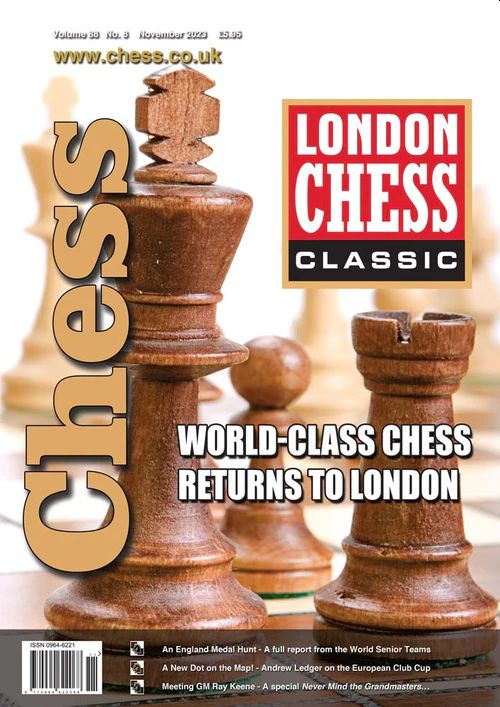
The above Interview is reproduced from Chess Magazine November/2023, with kind permission.
CHESS Magazine was established in 1935 by B.H. Wood who ran it for over fifty years. It is published each month by the London Chess Centre and is edited by IM Richard Palliser and Matt Read.
The Executive Editor is Malcolm Pein, who organises the London Chess Classic.
CHESS is mailed to subscribers in over 50 countries. You can subscribe from Europe and Asia at a specially discounted rate for first timers, or subscribe from North America.
| Advertising |